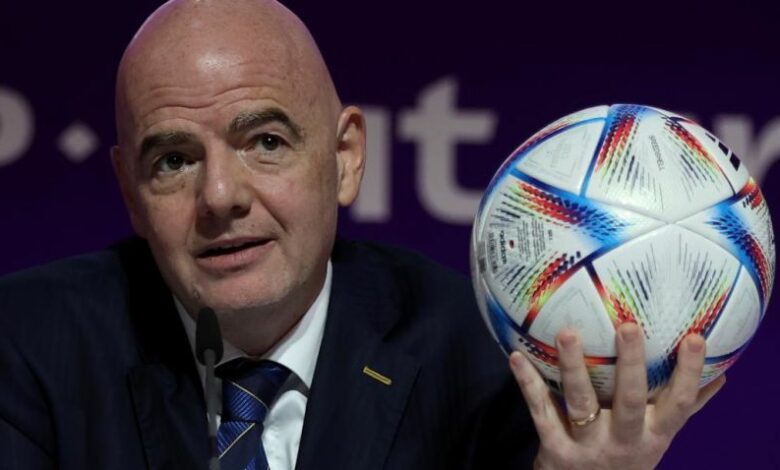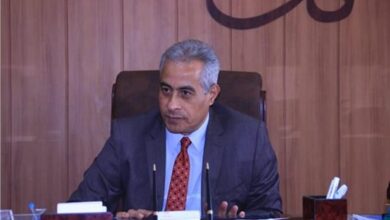
“Today I feel Qatari. Today I feel Arab. Today I feel African. Today I feel gay. Today I feel disabled. Today I feel a migrant worker,” FIFA chief Gianni Infantino said in a fiery tirade on Saturday, comparing his own plight as a redhead son of migrants to that of marginalized communities.
His ostensible empathy with Qatar was due to the barrage of criticism the nation has faced in Western media for hosting the tournament.
But it’s hypocritical of the West to be giving lessons in morality to others, he said.
Those statements on the eve of the World Cup went viral, inviting much anger and ridicule. But to many Arabs and Muslims, they resonated strongly.
In the run-up to the tournament, Western media coverage has been dominated by the controversies surrounding the event rather than the sport itself, including the Gulf nation’s treatment of migrant workers, its rules on LGBTQ people and its tight social restrictions. Britain’s public broadcaster, the BBC, refrained from airing the opening ceremony on television, opting instead to cover criticism of the host nation. The BBC said it did broadcast the ceremony on their video-on-demand service.
This year’s World Cup is certainly like no other before it. It is the first to be held in a Muslim country and Qatar has gone a long way to give the event a distinctly Arab and Muslim flavor.
The Bedouin-themed opening ceremony on Sunday began with a female singer donning a traditional burqa, a kind of face covering that has been banned in several European countries. It also cited a verse from the Quran about God creating humanity into “nations and tribes” so they can get to know each other.
According to social media reports, some hotel rooms in the country offer visitors QR codes to learn about Islam, and Muslim volunteers have been teaching visitors about Islamic fashion.
Qatar’s Supreme Committee for Delivery & Legacy (SC), which is responsible for overseeing the infrastructure projects and planning for the World Cup, didn’t respond to CNN’s request for comment.
But in an earlier statement to CNN, the SC said it was committed to “an inclusive and discriminatory-free” World Cup.
“Everyone is welcome in Qatar, but we are a conservative country and any public display of affection, regardless of orientation, is frowned upon. We simply ask for people to respect our culture.”
The visibility of Islamic symbols in Qatar hasn’t escaped those attending. An on-air joke by a French journalist about the presence of “a lot of mosques” in the country caused outrage among Muslims on social media.
Western news outlets have also been accused of peddling stereotypes about Arabs and Muslims.
The Times of London on Monday said “Qataris are unaccustomed to seeing women in Western dress in their country” in a photo caption that was later deleted after being flagged on social media. Around 87% of the country’s population of 2.9 million is made up of expatriates, many of whom are Western.
“I think that the Western media is biased because they don’t want to see an Arabic success, a Muslim success in the delivering and hosting of a global cup for football in a third [world country],” Najd Al-Mohanadi, a 20-year-old Qatari, told CNN.
But some in the Western media have spoken out against stereotyping and alleged biases. Ayman Mohyeldin, an MSNBC host who previously worked for Qatar’s Al Jazeera, said recent coverage of Qatar shows “the depths of Western prejudice, performative moral outrage and, perhaps most significantly, gross double standards.”
The Economist and the New York Times have also run articles defending Qatar’s right to host the tournament. The Times of London ran an essay saying criticism of Qatar was “laced with hypocrisy.”
“I always question the timing [of the criticism], as migrants throughout the region endure poor living arrangements for meager pay, while also working under strenuous physical and mental conditions,” said Mira Al Hussein, a postdoctoral researcher from the UAE who is studying at Oxford University in England.
“Scrutiny is overdue and it makes no sense to tie it to global events where virtue-signaling becomes deeply problematic,” Al Hussein told CNN.
“Especially when it comes from non-NGO entities that are themselves embroiled in human rights violations within and across their borders.”
James Lynch, director of the human rights group FairSquare and a former British diplomat in Qatar, said that while some of the coverage around Qatar in the West has reinforced negative stereotypes about the Arab Muslim world, most of the criticism has been “fair and proportionate.”
“It’s absolutely right to call out instances of that kind of coverage, but wrong to generalize from those examples to imply that all, or most, criticism is driven by racism,” he said.
Workers in the country continue to “face harsh, abusive working conditions and severe exploitation, with domestic and construction workers among those most at risk,” he said, adding that Qatar’s women and LGBTQ people “face serious discrimination and repression, both in law and practice.”
Critics of Western media coverage of Qatar have countered that other countries with questionable human rights records didn’t receive such scrutiny when hosting global sporting events.
Critics of Western media coverage of Qatar have countered that other countries with questionable human rights records didn’t receive such scrutiny when hosting global sporting events.
“At the risk of engaging in whataboutism… Qatar’s human rights records, as poor as they may be, cannot possibly be more outrageous than other countries, such as Russia, China and Israel,” said Al Hussein. “Qatar is certainly not engaging in ethnic cleansing, nor are migrants living in concentration camps, despite the poor living conditions.”
Maryam AlHajri, a Qatari researcher at the Doha Institute for Graduate Studies, said some of the recent rhetoric around Qatar shows that some Western critics have been more concerned with feeding into an “orientalist discourse,” referring to language aimed at imposing Western worldviews, than human rights.
“This should not be read as a justification to cease criticizing the migrant worker condition in Qatar,” she said. “Rather, it should be interpreted as an argument for the necessity to contextualize the migrant workers situation as part of a globalized economic order built on colonialism and racial capitalism.”
She noted however that some over-zealous defenders of the government on the Qatari side have neglected the country’s human rights shortcomings.
“Many of the people defending Qatar are also using terrifyingly pro-government language,” she said, adding that it reaches a point that doesn’t help the cause of Qatar’s migrant workers.
“The plight of migrant workers in places like the US or the UK does not take away from the fact that we have problems in Qatar,” AlHajri told CNN. “It shouldn’t be about whataboutism.”
With additional reporting from Mariam Dirar Alqasem in Doha




